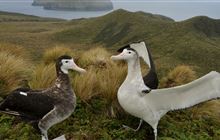Satellite tracker shows juvenile Antipodean albatross bycaught in the high seas
Archived content: This media release was accurate on the date of publication.
Introduction
Confirmation that an endangered juvenile Antipodean albatross has died after being caught by a foreign-flagged long line fishing vessel proves the value of a seabird satellite tracking programme.Date: 19 October 2021
NGOs working with the fishing company confirmed that the bird was bycaught in international waters in late June 2021. In cooperation with the fishing vessel and owner, the satellite tag has been retrieved.
“This is a species which hangs in the balance,” says DOC Aquatic Manager Elizabeth Heeg, “the loss of a single bird can have a large impact on their recovery.”
The population of Antipodean albatross has been declining at 5% per year since 2005 and is recognised as one of the most threatened albatross populations globally. If this current rate continues, there may be fewer than 400 breeding pairs in 20 years.
“However, it highlights how important this satellite tracking project is. With this data we can continue to refine our knowledge of the threats to the albatross and work with other countries to avoid these tragedies in the future,” says Elizabeth Heeg.
The albatross tracking program is a collaboration between DOC, Live Ocean, and Fisheries New Zealand. 67 new satellite tags were deployed in early 2021. This project provides valuable insight into the behaviours and movements of the species.
Bycatch in fisheries, particularly high seas tuna longline fisheries, is the greatest known threat to the Antipodean albatross. In 2019, a tagged bird was bycaught by a foreign-flagged tuna longline vessel. MPI was able to confirm the bycatch and recover the tag.
In addition to the efforts of NGOs, there are several ways that New Zealand is working to reduce the risk to Antipodean albatross. As well as introducing improved best practice bycatch mitigation standards in domestic fisheries in 2020, New Zealand worked with Chile and Australia to develop a plan to reduce bycatch in high seas fisheries.
This plan was adopted by the Convention on the Conservation of Migratory Species of Wild Animals and includes actions to promote seabird mitigation measures and practices through international fisheries management. Work is ongoing with other countries, particularly those operating fishing fleets on the high seas where Antipodean albatross forage, to improve their capacity to implement these measures.
Background information
DOC and MPI have been collaborating with Live Ocean to track Antipodean albatross to understand their distribution range, where they forage, and when and where they interact with dangerous fishing fleets.
Contact
For media enquiries contact:
Email: media@doc.govt.nz

